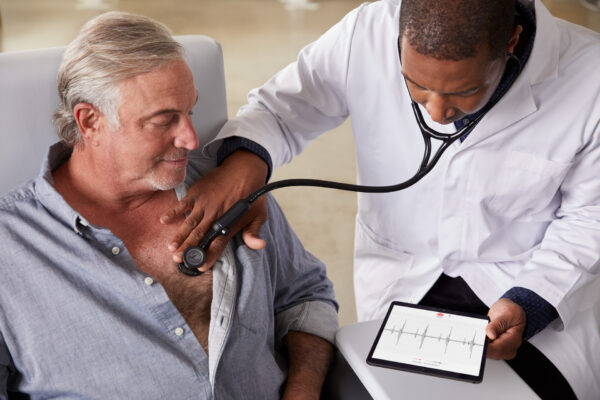
In combination with its app, Eko’s smart stethoscopes can be used to detect heart disease.
Eko—a maker of smart stethoscopes paired with software—announced Tuesday the launch of its newly redesigned app for cardiovascular disease screening. The Oakland, California company is focused on improving heart and lung disease detection.
Its smart stethoscopes are combined with accompanying automated disease detection software using the Eko App to analyze heart sounds with FDA-cleared AI algorithms. The redesigned app includes a range of new features to analyze heart sounds and rhythm for potential problems including automated detection of heart murmurs; atrial fibrillation detection (which is possible when used with the Eko DUO ECG); bradycardia, a slower than normal heart rate; and tachycardia, a heart rate over 100 beats per minute.
Eko’s technology is built for frontline healthcare workers, such as primary care doctors, nurse practitioners, physician assistants and registered nurses. It’s meant to be used to detect heart problems during a routine annual physical exam, well before a patient ever reaches a cardiologist or lands in the emergency room, according to the company.
However, the time constraints of primary care physicians don’t bode well for early detection of cardiac problems.
“Clinicians today are overburdened with a large patient and administrative workload which often limits the time they can spend assessing a patient’s cardiac health during physical encounters,” said Connor Landgraf, CEO and co-founder at Eko, in an email provided by a representative.
But primary care physicians armed with the Eko’s smart sthethoscope and app can more easily detect underlying heart problems.

A Deep-dive Into Specialty Pharma
A specialty drug is a class of prescription medications used to treat complex, chronic or rare medical conditions. Although this classification was originally intended to define the treatment of rare, also termed “orphan” diseases, affecting fewer than 200,000 people in the US, more recently, specialty drugs have emerged as the cornerstone of treatment for chronic and complex diseases such as cancer, autoimmune conditions, diabetes, hepatitis C, and HIV/AIDS.
When a problem is detected using the Eko App, this can lead to primary care providers appropriately referring patients to see a cardiologist, Landgraf said. They can also share findings, including recorded audio of heart sounds and visualizations of heart rhythm activity, with the cardiologist before the patient’s appointment.
This automated detection happens without the doctor diverging from their normal routine of listening to the patient’s heart and lungs through the stethoscope, Landgraf said. In short, they don’t need to change what they’re doing in their practice to potentially detect heart disease.
Given that heart disease is the No. 1 killer in the U.S., other health organizations are also targeting early detection. Companies are “democratizing” cardiac care by arming healthcare providers on the frontlines with the technology to help.
Cardiologs, for example, provides diagnostic software that enables any healthcare professional to detect arrhythmias. Sonavi Labs also makes AI-powered technology, including smart stethoscopes, that can be used by doctors, parents and patients to detect heart and lung problems.
Eko, which boasts having created the first AI stethoscope, designs its smart stethoscopes for health provider use only.
“The biggest potential impact is the opportunity to treat more patients with undiagnosed heart conditions earlier in the disease progression when intervention can have more favorable outcomes,” Landgraf said. “We know that in some rural and developing areas, access to specialists such as a cardiologist can be limited or even unavailable for the local population.”
Eko’s technology gives doctors who not extensively trained in treating heart disease the ability to detect heart murmurs and AFib, he said.
“In the hands and pockets of every frontline clinician (this) should lead to more heart disease caught earlier and brought to cardiology sooner for more timely treatment and effective management,” Landgraf said.
Photo: Mitch Tobias, courtesy of Eko Health













